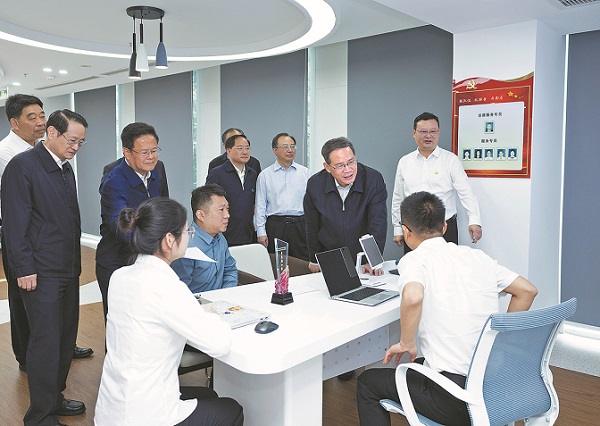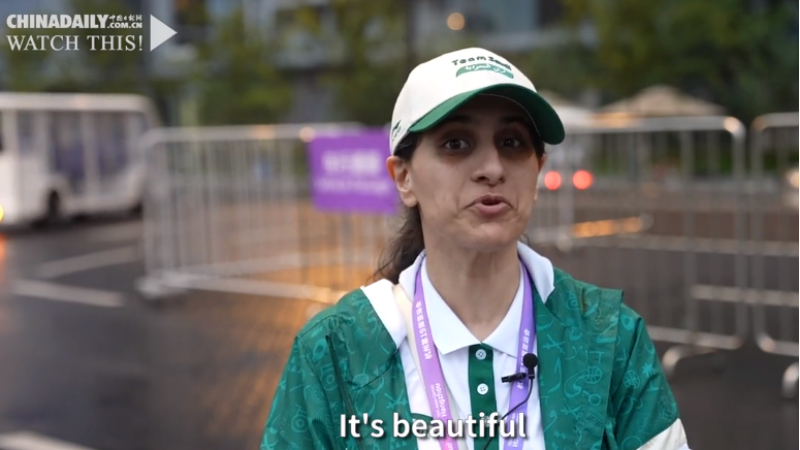Xi's Thought on Culture put forward
Xi Jinping Thought on Culture was formally put forward at a national meeting on work related to public communication and culture, which was held in Beijing on Saturday and Sunday.
President Xi Jinping stressed the need to foster a stronger sense of cultural confidence, uphold openness and inclusiveness, and strive to break new ground while upholding fundamental principles, in a recent instruction made for work that is related to public communication and culture.
The instruction made by Xi, who is also general secretary of the Communist Party of China Central Committee and chairman of the Central Military Commission, was conveyed at the two-day meeting in Beijing.
During the meeting, Xi Jinping Thought on Culture was put forward as part of Xi Jinping Thought on Socialism with Chinese Characteristics for a New Era.
In the instruction, Xi underlined new situations and tasks on the front of public communication and culture, as well as the need for fresh approaches and accomplishments, with the world undergoing major changes unseen in a century and the nation's great rejuvenation entering a crucial period.
He highlighted the need to focus on arming the Party with innovative theories and educating the people, and to continue promoting cultural prosperity, building a nation that is strong in culture, and developing modern Chinese civilization from a new historical starting point.
Xi stressed steps to enhance the Party's leadership over public communication and culture, develop a socialist ideology that has the power to unite and inspire the people, and cultivate and apply socialist core values.
It is important to carry forward Chinese cultural heritage, promote the creative transformation and innovative development of fine traditional Chinese culture, and promote the prosperity of the cultural sector, he said.
The president reiterated the need to enhance the nation's capacity in international communication, promote exchanges and mutual learning between civilizations, and fully stimulate the creativity and vitality of the entire nation in the cultural sector.
The goal is to keep enhancing the soft power and influence of Chinese culture and provide strong ideological assurance, powerful spiritual strength and favorable cultural conditions for building a modern socialist country and advancing the great rejuvenation of the Chinese nation, he said.
Participants in the Beijing meeting highlighted that Xi Jinping Thought on Culture has made clear the road map and letter of assignment for the development of culture in the new era.
It marked a new height for the CPC in its level of confidence over its history and culture and will serve as a powerful spiritual weapon and scientific playbook for work related to public communication, ideology and culture in the new era and on the new journey, they said.
Cai Qi, a member of the Standing Committee of the Political Bureau of the CPC Central Committee and a member of the Secretariat of the CPC Central Committee, spoke at the two-day meeting.
The meeting followed a decadelong effort from the CPC to build up the level of the nation's confidence regarding its culture and make the country more united and cohesive, as the world's second-largest economy forges ahead against various headwinds.
"We must not slacken or weaken the ideological work at any time while focusing on economic growth," Xi emphasized during a national meeting on public communication in 2013.
Han Qiang, dean of the School of Marxism at Beijing Foreign Studies University, said the establishment of Marxism at the guiding position in the ideological field has charted the right direction for the nation's course of public communications, ideology and culture.
The new ideas and judgments about cultural development in the new era put forward by Xi have enriched and developed Marxist cultural theories and led to Xi Jinping Thought on Culture, he said.
"With the nation's traditional culture being revitalized, the level of cultural confidence among the people has been brought to an unprecedented level, and the unity among society has been lifted," he said.
Meanwhile, Han observed that China's soft power in the world has also increased over the past decade, especially in the developing world.
"As the world's largest Marxist ruling party, the leadership of the CPC has been widely lauded by the international community, and the global recognition over Chinese culture has also been increased," he said.
In the eyes of many analysts, Xi has taken the imperative to pool strength from the nation's traditional culture and raise it to an unprecedented height, calling for the integration of basic tenets of Marxism with fine traditional Chinese culture, also known as the "second integration".
Building on the CPC's "first integration" theoretical synthesis — integrating the basic tenets of Marxism with China's specific realities, the "second integration", many analysts said, will pave the way for the building of China's own discourse system on civilization and help the nation firm up its confidence amid the complex international landscape.
Wang Huiyao, president of the Beijing-based think tank Center for China and Globalization, said that pooling strength from China's traditional culture, which emphasizes the value of harmony, family, education and diligence, coupled with the modern market system, will give rise to strong cohesive power and productivity in the nation.
He noted that the nation's deep-rooted Confucian culture is also shared by many other countries in East and Southeast Asia, and that amplifying elements from the culture will help promote the building of an Asian community with a shared future.
Stephen Ndegwa, executive director of South-South Dialogues, a development communication think tank based in Nairobi, Kenya, said China's cultural soft power "has been understated and underestimated because of its nonaggressive policies".
-
Li highlights need to boost digital economy
October 10, 2023
-
Xi declares Hangzhou Asian Games open
September 23, 2023
-
Xi stresses Olympic spirit in Hangzhou
September 23, 2023
-
Thumbs-up from Saudi Arabia
September 23, 2023



